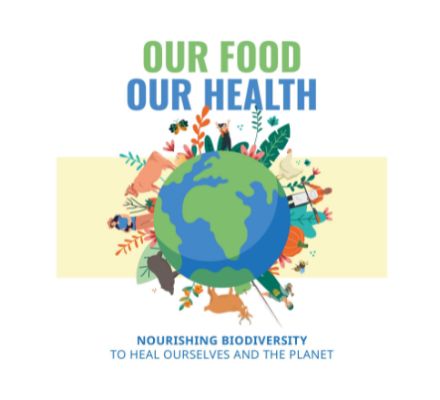On World Health Day 2022 (April 7) Slow Food Presents Its New Position Paper On Food And Health
Our Food, Our Health.
Nourishing biodiversity to heal ourselves and the planet
On World Health Day 2022
Slow Food presents its new position paper on Food and Health
“There is an indissoluble link between the health of humans, animals, plant life and the environment: the problems affecting each of all the categories of life must be tackled as part of an integrated approach,” says Edie Mukiibi, vice-president of Slow Food on the occasion of World Health Day 2022. “Health lies at the heart of Slow Food’s vision of making good, clean and fair food accessible to all. A healthy diet is not only nutritionally adequate, it also promotes human health and respects that of the planet. It should favor a rich diversity of foods of plant origin, whole foods and minimally processed foods, locally grown using sustainable methods, and, last but not least, a healthy diet can be, and is, enjoyable.”
On the occasion of World Health Day, Slow Food presents its position paper “Our food, our health. Nourishing biodiversity to heal ourselves and the planet”

Slow Food exists to nourish biodiversity, climate and health through food. “The defense of biodiversity, a battle that has always characterized our association, represents a possible solution to the climate crisis and malnutrition in all its forms: overnutrition, undernutrition and micronutrient deficiencies,” adds Marta Messa, director of Slow Food Europe. “Looking at the underlying trends that are shaping diets across the world and driving diet-related illnesses and malnutrition, we believe that a One Health approach can offer an understanding of how the way food is produced can directly impact human, animal, plant and planetary health.”
Slow Food’s position paper on Food and Health examines the current state of our global food systems and the ways in which Slow Food works to promote healthy diets. It also presents original research conducted by Slow Food to analyze the nutritional content of Slow Food products, as well as describing Slow Food’s main initiatives, such as food gardens and local markets, that support local communities and ensure healthy and sustainable diets by protecting biodiversity. It describes the way our food systems are being governed today and the need for better policymaking in the food and health field, concluding with Slow Food’s recommendations for European policymakers.
The current system is dominated by large corporations that produce, manufacture, distribute and sell food, framing the food choices that people may make by defining the top-down availability of food and food prices. The quality of food delivered is thus nutrient-poor, high in fat, salt and sugar, and lacking in important nutrients such as minerals and vitamins. Moreover, the excessive abundance of these foods also causes food security problems, since many individuals and communities now have no access to adequate and culturally appropriate diets.
“Often forgotten, local edible food plants can make a significant contribution to adequate nutrition and diet diversity. From a nutritional point of view, many local edible food plant species are richer in vitamins, minerals and macronutrients such as fats and proteins than conventional domestic species,” says Serena Milano, Secretary General of the Slow Food Foundation for Biodiversity. “Moreover, local edible food plants require less inputs (chemicals, water, fertilizers), are naturally better adapted to their environment, and are able to better withstand disease and pest pressures. Promoting local edible food plants is a strategy that increases diet diversity among urban and rural populations throughout the year, reducing hunger and the risk of malnutrition in times of food shortage and famine. What’s more, it is sustainable, cost-effective and proven to work.”
There is another element that has an impact on our health: the climate crisis. It is impacting all environmental systems, hence harming human health. Moreover, global food security is also under threat as rising temperatures and variations in rainfall, plus extreme events like heatwaves, floods and droughts, have a profound effect on agricultural productivity.
Our diet is one of the drivers of climate change, with meat production alone accounting for nearly a fifth of global greenhouse emissions, but at the same time the overconsumption of red meat also has negative effects on human health. Climate change can also make food less nutritious, since nutritional impoverishment due to increased CO2 concentrations can affect the concentrations of almost all micronutrients. This alteration in the nutritional value of food due to climate change thus joins the list of the consequences caused by soil depletion.
This is why it is on World Health Day that Slow Food strongly reaffirms its commitment to promoting healthy and sustainable eating habits in which food is considered vital both for the health of the environment and for the health of the people that produce and consume it.


 UN News: Indian Ocean Tsunami Anniversary - A Call To Safeguard Future Generations
UN News: Indian Ocean Tsunami Anniversary - A Call To Safeguard Future Generations Milad Haghani & Arthur Stukas, The Conversation: 50 years ago, Cyclone Tracy flattened Darwin – and Australia’s attitude to disasters changed forever
Milad Haghani & Arthur Stukas, The Conversation: 50 years ago, Cyclone Tracy flattened Darwin – and Australia’s attitude to disasters changed forever UN News: General Assembly Approves $3.72 Billion UN Budget For 2025
UN News: General Assembly Approves $3.72 Billion UN Budget For 2025  Brenna R. Hassett, Human Bridges: The Controversy Over Cannibalism
Brenna R. Hassett, Human Bridges: The Controversy Over Cannibalism Save The Children: One Week On From Devastating Earthquake, Families In Vanuatu Still Terrified
Save The Children: One Week On From Devastating Earthquake, Families In Vanuatu Still Terrified UN News: Over 207 Executed In Port-Au-Prince Massacre - UN Report
UN News: Over 207 Executed In Port-Au-Prince Massacre - UN Report